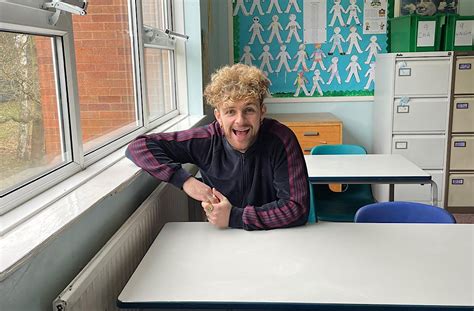A Quote by Pat Barker
Sometimes, in the trenches, you get the sense of something, ancient. One trench we held, it had skulls in the side, embedded, like mushrooms. It was actually easier to believe they were men from Marlborough's army, than to think they'd been alive a year ago. It was as if all the other wars had distilled themselves into this war, and that made it something you almost can't challenge. It's like a very deep voice, saying; 'Run along, little man, be glad you've survived
Quote Topics
Actually
Alive
Almost
Along
Ancient
Army
Been
Believe
Challenge
Deep
Distilled
Easier
Embedded
Get
Glad
Had
Held
Like
Little
Little Man
Made
Made It
Man
Men
Mushrooms
Other
Run
Saying
Sense
Side
Skulls
Something
Sometimes
Survived
Than
Themselves
Think
Trench
Trenches
Very
Very Deep
Voice
War
Wars
Were
Year
Related Quotes
People just like the thrill of anything. Dangerous things and dark things are exciting. Like as a kid, I knew I wasn't going to get killed if I went into the Haunted House but you kind of feel like you are. And when it comes out the track the other side, it's like, "we're still alive"! And I find it really funny when adults get really scared because I've not been really scared since I saw Jaws when I was a little kid. I just think people like the thrill of it, they like to feel like they accomplished something, that they survived the movie.
South Korea at the end of the Second World War had a very low level of literacy. But suddenly, like in Japan, they determined they were going in that direction. In 20 years' time, they had transformed themselves. So when people go on saying that it's all because of perennial culture, which you cannot change, that's not the way the South Korean economy was viewed before the war ended. But again within 30 years, people went on saying there's an ancient culture in Korea that has been pro-education, which is true.
I think subconsciously or selfishly I knew that I was supposed to do something. It was like a thumping or a throbbing saying, "Yes, this what you've been waiting for." But you're a little dim to those spiritual thoughts when you're dumb like me. So I did have to get a little bit of a kick. I played it for a bunch of people and I think their reactions were warm and deep enough that they gave me the courage to get [the record] out there.
Sometimes it's not like I write very specific, it's more like I add an atmosphere almost to something that might have been quite awkward in my mind from the beginning. Something has happened and I want to force myself to think of it in a more positive way. And then I force myself to write something that convinces me that this is actually something pretty good or something that I learned something valuable from.
I think that nonviolence is one way of saying that there are other ways to solve problems, not only through weapons and war. Nonviolence also means the recognition that the person on one side of the trench and the person on the other side of the trench are both human beings, with the same faculties. At some point they have to begin to understand one another.
There is a note that comes into the human voice by which you may know real weariness. It comes when one has been trying with all his heart and soul to think his way along some difficult road of thought. Of a sudden he finds himself unable to go on. Something within him stops. A tiny explosion takes place. He bursts into words and talks, perhaps foolishly. Little side currents of his nature he didn't know were there run out and get themselves expressed. It is at such times that a man boasts, uses big words, makes a fool of himself in general.
A voice had begun to sing. It was very far away and Digory found it hard to decide from what direction it was coming. Sometimes it seemed to come from all directions at once. Sometimes he almost thought it was coming out of the earth beneath them. Its lower notes were deep enough to be the voice of the earth herself. There were no words. It was hardly a tune. But it was beyond comparison, the most beautiful sound he had ever heard.
Now very much against her will, she thought of the way Jace had looked at her then, the blaze of faith in his eyes, his belief in her. He had always thought she was strong. He had showed it in everything he did, in every look and every touch. Simon had faith in her too, yet when he'd held her, it had been as if she were something fragile, something made of delicate glass. But Jace had held her with all the strength he had, never wondering if she could take it--he'd known she was as strong has he was.
I moved right to L.A., and I had a year of active unemployment. I had 50-something auditions for 50-something different projects, testing and doing callbacks, and could not get hired. And then, almost a year to the day of being out in L.A., I booked my first job, and then I started booking something every other month.
There was a reason these boys were still alive, though. Something made them stronger than the other kids, the ones who had died in the early days, who had simply lain down and given up, unable to cope with the terrible things that were happening in the world. These boys were survivors. The will to live was stronger than any other feelings.
In fiction the narrator is a performance of voice, and it can be any style of voice, but I'm interested in the ways that a voice that knows it's telling a story is actually telling a different story than it intends to. In the way that I can sit here and tell you what I had for breakfast, but I'm really telling you that I'm having an affair, something like that. And I don't think my writing is plain, but I think a lot of my characters are just talking. There is vulnerability there, in that we can start to see through them, we can start to see where they're deceiving themselves.







































